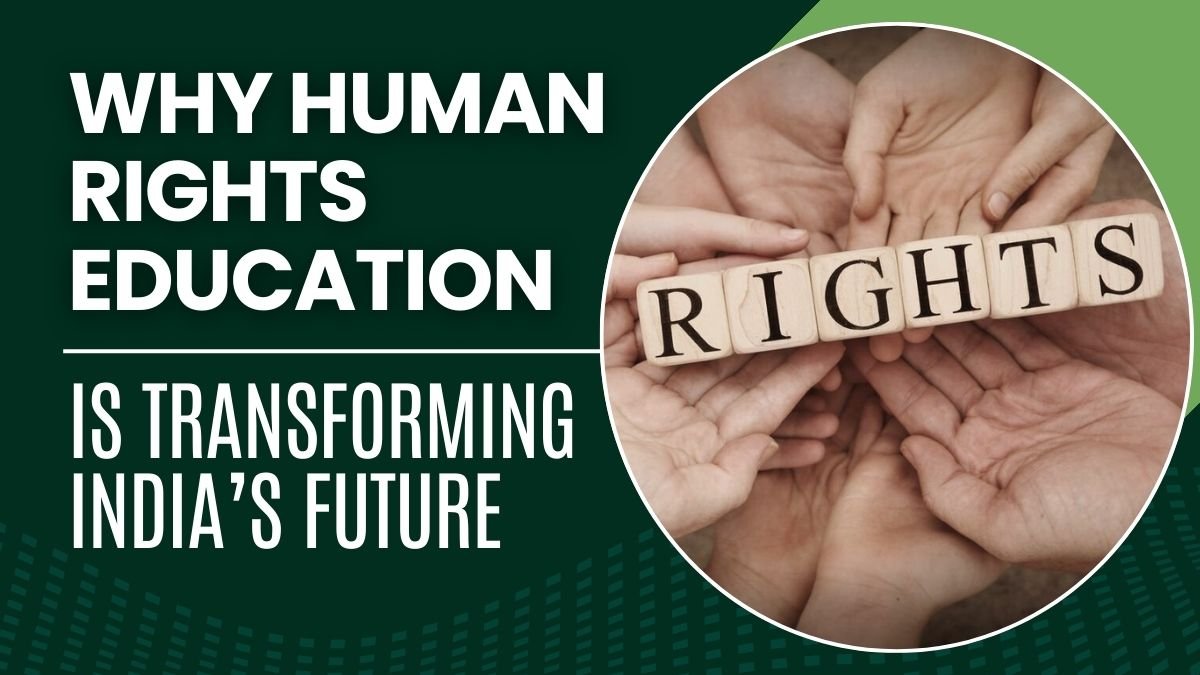Human rights are the backbone of any democratic society. They not only make citizens aware of their rights but also ensure that every individual can live a life with dignity, equality and freedom. In a diverse country like India, where there are innumerable layers of language, culture, religion and social background, the role of Human Rights Education (HRE) becomes even more important. It is not just an academic subject but a thought process that makes citizens responsible, tolerant and aware.
Awareness and Empowerment: The First Step Towards Equality
The biggest benefit of human rights education is that it makes people aware of their fundamental rights and constitutional safeguards. This education acts as an empowering tool, especially for the marginalized sections of society. When ordinary citizens recognize their rights and learn to demand accountability from institutions, it strengthens democracy.
For example, if a worker is unaware of his labor rights, he is bound to be exploited. But when the same worker knows through HRE that he has the right to minimum wages, a safe workplace and social security, he can demand his rights.
Inculcating tolerance and harmony in diversity
India’s greatest strength is its diversity, but this diversity sometimes becomes the cause of tension and conflict. Human rights education encourages values like tolerance, empathy and mutual respect. It teaches people that people of different religions, castes or cultures are part of the same society, and it is necessary to respect the dignity of all.
This education not only connects the youth with the knowledge of textbooks but also sensitizes them towards social issues. When people start understanding the suffering of others, an atmosphere of peace and harmony is created in the society.
A weapon to fight inequality and injustice
Human rights education gives people the ability to think critically. It inspires them to question social inequalities and unjust practices. For example, evils like child marriage, gender discrimination or caste discrimination can only end when citizens understand these issues as injustice and raise their voices against them.
HRE helps in understanding that poverty, discrimination and inequality are not just individual problems but are part of a larger social structure that needs to be changed.
Strengthening democracy and good governance
India’s democracy can only succeed when citizens are not only aware of their rights but also understand their duties. Human rights education promotes active citizenship. Informed citizens participate in voting, policymaking, and social decisions, making governance more transparent and responsible.
The National Human Rights Commission (NHRC) also emphasizes that HRE is extremely important for the protection and strengthening of democracy. This education helps in reducing conflicts and rights violations in the society as people learn to find peaceful solutions.
Ethical decisions and social responsibility
In today’s time, only technical or professional knowledge is not enough. It is important that people take their decisions from an ethical perspective as well. Human rights education provides an ethical framework on which to make responsible decisions, from personal to corporate life.
For example, when a company takes into account workers’ rights and environmental responsibility, it is the result of ethical decisions inspired by HRE.
Towards social and structural change
HRE has the potential to bring about change not only at the individual level but also in entire societies and systems. It teaches people skills such as advocacy, negotiation, and mediation. Through these skills, citizens can effectively raise their voice for human rights and social justice.
Also, this education provides an opportunity to understand the root causes of inequality and injustice. Only when society recognizes these causes is lasting and real change possible.
Building a Human Rights Culture
The ultimate goal of human rights education is to create a culture where respect for rights naturally becomes a habit of society. Incorporating HRE in schools, colleges, and training institutes will make the coming generation more aware, responsible, and just.
Only when every individual begins to understand that it is his duty to respect the rights of others will true equality and justice be established in society.
Impact of Human Rights Education in Various Fields
The impact of human rights education is not limited to social and political fields only. It also plays an important role in fields like medicine, business, arts, and media.
- Medical field: HRE sensitizes doctors and health workers towards the rights of patients. This makes health services more humane and accessible.
- Business field: It makes companies responsible towards Corporate Social Responsibility (CSR) and worker rights.
- Humanities and Arts: Literature, drama, and media help in bringing human rights issues to the public consciousness. Arts and media keep the dialogue and debate alive in society.
Conclusion
Human rights education has the power to transform India’s future. It not only makes citizens aware and empowered but also deeply establishes a culture of tolerance, equality and justice. The aim of HRE is not only to know the rights but also to implement them in everyday life.
If India is to truly become a just, equal and democratic society, human rights education must be prioritized at every level of the education system and social life.
